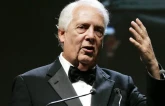
Agron Hasbajrami pleaded guilty in June to attempting and conspiring to support terrorists, nearly four years after he was arrested while preparing to board a flight to Turkey in September 2011.
It was his second guilty plea, after he had withdrawn the first plea. Prosecutors say he will likely be deported upon release.
Hasbajrami had moved to the United States in 2008 and was a legal resident in Brooklyn, New York before his arrest.
Read: US man jailed over 2009 ISI attack
In 2011, Hasbajrami wired more than $1,000 to "support terrorist activities" in Pakistan and Afghanistan before trying to travel to Pakistan's tribal belt to join extremists, prosecutors said.
He had expressed his desire to die as a martyr in an email to an unnamed individual in Pakistan, who claimed to be a member of an armed group which had boasted of killing US soldiers and kidnapped Westerners.
On September 6, 2011, Hasbajrami was arrested at New York's JFK airport, carrying a tent, boots and cold-weather gear a day after buying a one-way ticket to Turkey, from where he planned to travel to Pakistan.
Read: Pakistani-American brothers jailed for planning New York bombing, assaulting federal agents
US agents found a note reading "Do not wait for invasion, the time is martyrdom time," during a search of his Brooklyn home.
Hasbajrami was arrested four months after US special forces killed al Qaeda mastermind Osama bin Laden in Pakistan.
Sentencing sets up warrantless wiretap challenge
A federal appeals court will now hear a rare challenge to the US government's controversial warrantless wiretapping programme.
Agron Hasbajrami, 31, is one of five defendants to have received notice from the US Department of Justice last year
that evidence against them was gathered through the surveillance programme.
The programme was authorized under a 2008 law that allows government agencies to sweep up communications between US residents and foreign citizens living abroad who are intelligence targets.
Civil rights groups like the American Civil Liberties Union have argued that the government should be required to obtain
warrants to examine any communications gathered from Americans. Hasbajrami's lawyers are expected to make that argument to the 2nd US Circuit Court of Appeals in New York.
A similar case is on appeal at the 9th Circuit in San Francisco. In that case, Mohamed Mohamud, a naturalised US
citizen, was sentenced to 30 years in prison for trying to blow up a Christmas tree lighting celebration in Oregon in 2010.
In 2013, the US Supreme Court threw out a challenge to the law brought by the ACLU and other groups, finding they did not
have standing to sue because they had not been specifically harmed.
Hasbajrami had pleaded guilty in 2012 and was sentenced to 15 years. But US District Judge John Gleeson in Brooklyn
permitted him to withdraw his plea after Hasbajrami learned that the key evidence in his case had been collected without a
warrant.
After Gleeson denied his bid to suppress the evidence, however, Hasbajrami again pleaded guilty.
Prosecutors had asked Gleeson to impose a 20-year sentence this time, saying they had decided upon reflection that the initial deal was too generous. But Gleeson, who had criticised the original plea bargain as too lenient, said it would be wrong to punish Hasbajrami for exercising his rights.
"I just don't think it's fair," he said. Gleeson did, however, add a year to the sentence after finding that Hasbajrami had lied in a letter to the court claiming misconduct on the part of his lawyers.
Acting Brooklyn US Attorney Kelly Currie said in a statement that the sentence ensured "he will no longer pose a threat to the United States and our allies."
Joshua Dratel, a lawyer for Hasbajrami, said they were looking forward to litigating the surveillance issue on appeal.
However, if the 2nd US Circuit Court of Appeals upholds the district court's verdict, the case would undoubtedly used as a pinup for the under-fire US intelligence community that surveillance, especially warrantless surveillance, can lead to terror convictions.







1734934759-0/Copy-of-Untitled-(77)1734934759-0-270x192.webp)
1734954745-0/Copy-of-Untitled-(89)1734954745-0-270x192.webp)
1734937565-0/Copy-of-Untitled-(80)1734937565-0-270x192.webp)
1734942634-0/Copy-of-Untitled-(82)1734942634-0-270x192.webp)





1734778885-0/Untitled-(10)1734778885-0-270x192.webp)






COMMENTS
Comments are moderated and generally will be posted if they are on-topic and not abusive.
For more information, please see our Comments FAQ